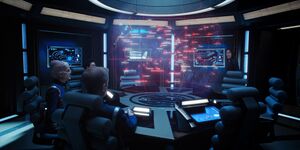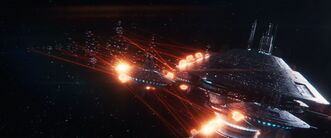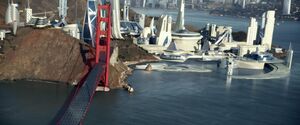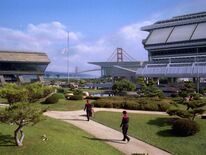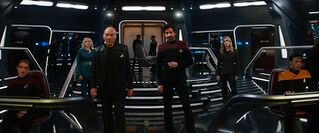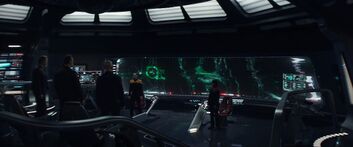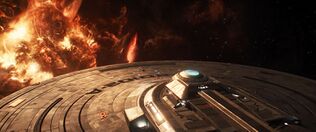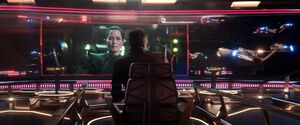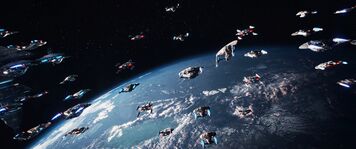Difference between revisions of "Starfleet"
Teylasramar (talk | contribs) |
|||
| (2 intermediate revisions by 2 users not shown) | |||
| Line 1: | Line 1: | ||
{{ | {{Icons|bfc|sf|fed}} | ||
{{Organisation | {{Organisation | ||
|name=Starfleet | |name=Starfleet | ||
| Line 13: | Line 13: | ||
|status=Active | |status=Active | ||
}} | }} | ||
{{quote|You're a Starfleet captain. You believe in service, sacrifice, compassion, and love.|'''Captain Christopher Pike''', 2257}} | |||
Starfleet is the exploratory and defence service of the [[United Federation of Planets]]. Its primary purpose is scientific discovery, with the majority of its resources and personnel dedicated to missions of exploration and research. Alongside that stands the work of Starfleet diplomats, representing the Federation's interests abroad through the pursuit not just of peace and stability, but Federation ideals of justice and equality. Finally, Starfleet provides security to Federation citizens, including protection of shipping lanes and borders and, when necessary, military deployment. Starfleet units are often highly flexible, capable by training and ideology of undertaking a wide range of missions. | Starfleet is the exploratory and defence service of the [[United Federation of Planets]]. Its primary purpose is scientific discovery, with the majority of its resources and personnel dedicated to missions of exploration and research. Alongside that stands the work of Starfleet diplomats, representing the Federation's interests abroad through the pursuit not just of peace and stability, but Federation ideals of justice and equality. Finally, Starfleet provides security to Federation citizens, including protection of shipping lanes and borders and, when necessary, military deployment. Starfleet units are often highly flexible, capable by training and ideology of undertaking a wide range of missions. | ||
| Line 60: | Line 58: | ||
== Personnel== | == Personnel== | ||
[[File: | [[File:Bridgecrew1.jpg|alt=|thumb|319x319px|Starfleet personnel are bound together not merely by discipline, but shared ideals and principles]] | ||
Starfleet personnel are organised in a naval-derived rank structure with a chain of command, and are either enlisted personnel or officers. Commissioned officers are some of the most talented and skilled individuals in the Federation, extensively trained at the Academy, and commit to Starfleet service usually for their entire lives. People become officers because they want to be leaders in the service, in their departments, on their ships, or at Starfleet Command itself. | Starfleet personnel are organised in a naval-derived rank structure with a chain of command, and are either enlisted personnel or officers. Commissioned officers are some of the most talented and skilled individuals in the Federation, extensively trained at the Academy, and commit to Starfleet service usually for their entire lives. People become officers because they want to be leaders in the service, in their departments, on their ships, or at Starfleet Command itself. | ||
| Line 70: | Line 68: | ||
=== Frontier Day === | === Frontier Day === | ||
[[File:Frontierday2.jpg|thumb|Starfleet crews slaughtered each other on Frontier Day]] | [[File:Frontierday2.jpg|thumb|Starfleet crews slaughtered each other on Frontier Day|353x353px]] | ||
In April 2401, the galaxy bore witness to the mass slaughter and death of Frontier Day. A threefold trauma was inflicted on Starfleet: the spontaneous assimilation of young adult officers into Borg drones with the directive to 'kill all unassimilated'; the ensuing death and destruction as crews were slaughtered by their own and starships turned on each other; and, in the aftermath, the discovery this had all happened because the highest echelons of Starfleet Command had been infiltrated and compromised by renegade Changelings bent on destroying the Federation. Starfleet will live with the scars of that day for a generation. A significant percentage of non-junior officers were slaughtered on Frontier Day, especially - but not limited to - those serving on ships at Sol. Survivors witnessed their crewmates cut their fellows down without restraint or quarter. Those young officers, though ultimately liberated from the thralldom of the Borg Collective, still went through that experience and committed these horrifying deeds. | In April 2401, the galaxy bore witness to the mass slaughter and death of Frontier Day. A threefold trauma was inflicted on Starfleet: the spontaneous assimilation of young adult officers into Borg drones with the directive to 'kill all unassimilated'; the ensuing death and destruction as crews were slaughtered by their own and starships turned on each other; and, in the aftermath, the discovery this had all happened because the highest echelons of Starfleet Command had been infiltrated and compromised by renegade Changelings bent on destroying the Federation. Starfleet will live with the scars of that day for a generation. A significant percentage of non-junior officers were slaughtered on Frontier Day, especially - but not limited to - those serving on ships at Sol. Survivors witnessed their crewmates cut their fellows down without restraint or quarter. Those young officers, though ultimately liberated from the thralldom of the Borg Collective, still went through that experience and committed these horrifying deeds. | ||
| Line 90: | Line 88: | ||
===Defence=== | ===Defence=== | ||
Starfleet is not a military, though it is responsible for the necessary armed defence of borders against enemy incursions and has historically mobilised for strategic aggression in times of war. It also oversees internal security, protecting shipping routes and civilian habitats against criminal activity. However, it lacks many, if any, elements of military culture; its structures and forces are not built around combat activities, its primary role is not the preparation for and conduct of war, and its personnel are not defined and do not identify as soldiers or warriors in ethos or name. While it maintains an orderly chain of command, discipline stems from mutual respect and commitment to shared ideals rather than conditional training or use of force. Most personnel are expected to defend themselves, but plenty of Starfleet officers cannot or will not fight and are still able to serve in even frontier positions as respected parts of the organisation. As established, even more martially-trained officers approach their work from a position of scholarship, understanding of the cultural and political context of warfare, and goals of de-escalation or preventative strategies. The ideal officer is a scholar, or explorer, or diplomat, not a soldier, and this is reflected in the Starfleet culture. | Starfleet is not a military, though it is responsible for the necessary armed defence of borders against enemy incursions and has historically mobilised for strategic aggression in times of war. It also oversees internal security, protecting shipping routes and civilian habitats against criminal activity. However, it lacks many, if any, elements of military culture; its structures and forces are not built around combat activities, its primary role is not the preparation for and conduct of war, and its personnel are not defined and do not identify as soldiers or warriors in ethos or name. While it maintains an orderly chain of command, discipline stems from mutual respect and commitment to shared ideals rather than conditional training or use of force. Most personnel are expected to defend themselves, but plenty of Starfleet officers cannot or will not fight and are still able to serve in even frontier positions as respected parts of the organisation. As established, even more martially-trained officers approach their work from a position of scholarship, understanding of the cultural and political context of warfare, and goals of de-escalation or preventative strategies. The ideal officer is a scholar, or explorer, or diplomat, not a soldier, and this is reflected in the Starfleet culture. | ||
[[File:Starfleetfleet1.jpg|left|thumb|Starfleet is not a military force, but will assemble the fleet in times of need]] | [[File:Starfleetfleet1.jpg|left|thumb|Starfleet is not a military force, but will assemble the fleet in times of need|356x356px]] | ||
While this serves Starfleet well in its primary missions of science and diplomacy, it has left it occasionally ill-prepared for warfare. The Klingon-Federation War of the 2250s saw Starfleet taking massive losses at the hands of the Klingon Empire, and afterwards, it remained resistant to calls for reform. The paradigm has shifted since the Borg threat of the 2360s, with more starships and technologies developed exclusively for war. This militarised innovation continued through the Dominion War, and while it diminished in the aftermath, this and the Attack on Mars have had a significant impact on Starfleet culture. Policies of border defence and a focus on internal security have persisted since, turning Starfleet to more of a culture of caution and protection. | While this serves Starfleet well in its primary missions of science and diplomacy, it has left it occasionally ill-prepared for warfare. The Klingon-Federation War of the 2250s saw Starfleet taking massive losses at the hands of the Klingon Empire, and afterwards, it remained resistant to calls for reform. The paradigm has shifted since the Borg threat of the 2360s, with more starships and technologies developed exclusively for war. This militarised innovation continued through the Dominion War, and while it diminished in the aftermath, this and the Attack on Mars have had a significant impact on Starfleet culture. Policies of border defence and a focus on internal security have persisted since, turning Starfleet to more of a culture of caution and protection. | ||
Latest revision as of 16:36, 9 March 2024
- "You're a Starfleet captain. You believe in service, sacrifice, compassion, and love."
- —Captain Christopher Pike, 2257
Starfleet is the exploratory and defence service of the United Federation of Planets. Its primary purpose is scientific discovery, with the majority of its resources and personnel dedicated to missions of exploration and research. Alongside that stands the work of Starfleet diplomats, representing the Federation's interests abroad through the pursuit not just of peace and stability, but Federation ideals of justice and equality. Finally, Starfleet provides security to Federation citizens, including protection of shipping lanes and borders and, when necessary, military deployment. Starfleet units are often highly flexible, capable by training and ideology of undertaking a wide range of missions.
History
Many of Starfleet's origins can be found in the United Earth Starfleet of the 22nd century. Founded as an exploratory body, its militarisation developed first at the encounter of dangers in deep space, but accelerated with the Xindi Crisis and Romulan War of the 2150s. This war included military action alongside the navies of other future Federation members, and paved the way for modern Starfleet. When the Federation was founded it pursued policies of peace and exploration, and Earth Starfleet was selected as the service to retain as, unlike the armed srvices of the Andorians, Vulcans, or Tellarites, it maintained a primary mandate of scientific operations. Those services were amalgamated into the new, combined organisation, its operations overseen by Starfleet Command.
For the last two and a half centuries, Starfleet has continued this mission of science and diplomacy, pushing the limits of Federation knowledge. It has mobilised for war on several occasions, taking heavy losses in the Klingon-Federation War of the 2250s, and maintaining the tense peace with the Klingon Empire for the following 50 years until the Khitomer Accords. Numerous missions of exploration provided opportunities for colonisation and diplomacy with potential member worlds, expanding the Federation's borders greatly in this time.
Starfleet developed its defensive protocols after the discovery of the Borg threat in the 2360s, which proved timely with the outbreak of hostilities with the Klingon Empire and the Dominion over the next decade. While it attempted to return to its original mandate in the aftermath, the crises of the Romulan Supernova and the Attack on Mars changed the course. After devastating losses to its fleet power and a shift in Federation policy to focus on domestic affairs, Starfleet's exploratory operations have been greatly reduced over the last decade and a half. For much of this time, the majority of Starfleet resources were dedicated to domestic scientific research and border and internal security.
25th Century
In April 2399, Starfleet learnt the truth about the Attack on Mars: that it was not a result of synthetic workers malfunctioning but being deliberately sabotaged by Romulan agents. The Federation realised that their motivation for the downturn of the last fifteen years was based on a lie, and both lifted the ban on synthetic life and drove its foreign policy back towards that of diplomatic outreach and scientific understanding. Starfleet followed suit, returning to missions of deep space exploration, humanitarian aid, and diplomacy beyond the Federation's borders.
Two years of this new policy showed great success and was to culminate in celebrations on Frontier Day in April 2401. This great ceremony, ostensibly to commemorate the anniversary of the birth of 'modern' Starfleet, also served as the organisation's unofficial pronouncement to the galaxy of being 'back.' But Frontier Day was also the result of machinations by renegade Changelings and a final, defiant strike by the surviving Borg Queen, who orchestrated the assimilation of countless young officers and set Starfleet ships against each other in a devastating battle. Thousands of Starfleet officers at Sol were killed, particularly the older generation, who had not been subjected to the Queen's assimilation were gunned down by their young shipmates, and hundreds of ships heavily damaged or even destroyed. Though the hard work of Admiral Jean-Luc Picard and the former crew of the USS Enterprise-D destroyed the Borg and ended the attack, Starfleet suffered a major setback in its efforts to rejoin the galaxy.
As of mid-2401, Starfleet is still recovering. Many ships have been lost, and a generation of seasoned officers nearly wiped out. Internal security is chaotic, but leadership is intent in not falling to paranoia and not allowing Frontier Day to become like Mars: a reason to turn their backs on the galaxy. The return to the final frontier is fraught, but ongoing.
Organisation
Command
As Starfleet is a service of the Federation, the Federation President has direct commanding authority over the service. The Federation Council also has means of influencing Starfleet operations and has issued orders on occasion. However, day-to-day operations are managed by Starfleet Command under a commander-in-chief. Starfleet Command can also refer to the larger body of Starfleet leadership, including the fleet commanders and directors of Starfleet departments. Adjacent to these hierarchies are those of sector commands, which oversee permanent operations across sectors of Federation space.
The service maintains a set of regulations known as the General Orders and Regulations. These govern all aspects of service operations and are designed to cover all possible scenarios that might be encountered by Starfleet personnel. This includes the most important and the most famous regulation, General Order One, most commonly known as the Prime Directive.
Starfleet Training Command
Main Article: Starfleet Training CommandStarfleet Training Command oversees the training of all Starfleet personnel. Starfleet Academy is the body responsible for training Starfleet officers. The term is often used interchangeably with the main campus in San Francisco, but Starfleet Academy has multiple facilities across the Federation to support both the vast number of officer candidates and the need for highly specialised training. One of these campuses is based on Mellstoxx III to provide the Fourth Fleet with trained personnel. Training as an officer takes a minimum of four years, and officer candidates graduate with an academic degree.
Enlisted personnel, who need less intensive and often more practical training, train at Enlisted Training Centers that can be found across the Federation on major starbases and member worlds. This training lasts between six months and a year before trainees are qualified for service as Crewmen.
Infrastructure
Starfleet retains multiple permanent fleets, each serving a specific role. This includes overseeing a particular area of operations or performing specific duties. These fleets retain their own headquarters and administrative infrastructure, sometimes including shipyards dedicated to the maintenance and construction of their own vessels. Other shipyards, starbases, and planetary facilities are built and maintained by Starfleet across the Federation. These often fall under local sector command, serving a purpose for security, research, or civilian support in a region.
Starfleet has a vast number of starships capable of performing a variety of duties. These range from huge exploratory vessels to local supply or patrol ships. While the composition of its forces changes according to the Federation's needs and the ethos of Starfleet at any given time, the most prestigious ships are traditionally large explorers capable of deep-space operations, designed for missions that push the boundaries of Federation knowledge.
After the need to repurpose their fleet back to scientific and diplomatic outreach and the heavy losses at Frontier Day, Starfleet relies not only on the newest and most advanced designs of starships but has taken great strides in refitting and repurposing older, mid-to-late 24th-century ships, to fill its ranks and fulfil its missions.
Hazard Team
The increasing dangers faced by Starfleet in the 24th century led to increasing militaristic development. While Starfleet never lost sight of its original purpose, this resulted in the formation of Hazard Teams. Only assigned to starships expecting dangerous away missions, they are drawn from the current crew as a permanent, well-equipped and well-trained unit to face these risks. Outside of these missions and training, they continue their day-to-day responsibilities aboard. This has allowed Starfleet to keep elite, tight-knit teams for missions that need them, without these officers becoming immersed in a militarised environment or lifestyle.
Personnel
Starfleet personnel are organised in a naval-derived rank structure with a chain of command, and are either enlisted personnel or officers. Commissioned officers are some of the most talented and skilled individuals in the Federation, extensively trained at the Academy, and commit to Starfleet service usually for their entire lives. People become officers because they want to be leaders in the service, in their departments, on their ships, or at Starfleet Command itself.
Enlisted personnel receive shorter training and serve in either more broad roles, or specialised positions. They may still be highly qualified, and many ratings have academic degrees or professional experience in their field but do not aspire to move beyond their specialisation. They may be operations or security personnel doing practical work requiring limited formal education, but they might also be scientists who rarely work outside of their starship's laboratory facilities. While many enlisted personnel have just as long careers as officers, it is common to serve only one or two tours of duty before returning to civilian life. This can be out of a desire to see the galaxy, a desire to serve the Federation, or simply an opportunity for training and experiences they could not easily get elsewhere while not sacrificing other ambitions or commitments.
All officers outrank all enlisted personnel; even the lowliest ensign may give orders to a chief petty officer. In both practice and policy, this is not an assumption of a young officer's superior judgement. Junior officers are trained and developing unit leaders with the skills and education to manage teams and departments, deploying sometimes seasoned personnel according to the needs of the assignment and trusting them to execute their orders with the benefit of their years of experience. Starfleet principles of respect and equality ensure the chain of command does not demean veteran non-commissioned officers, while enlisted personnel recognise that young officers have been trained for their duties and given assignments where they make strong leaders or managers, rather than disrespecting them for their age or lack of field knowledge. This structure helps provide well-rounded teams of different learning styles and experiences.
Most members of Starfleet are Federation citizens, and must have reached the age of majority in their society to serve as active duty personnel. Minors may attend Starfleet Academy if they are successful applicants, subject to robust scrutiny during recruitment. Non-citizens require sponsorship from a command-level officer if they wish to apply, and such individuals are a significant minority. Due to the cultural heritage of Earth Starfleet and the variety of experiences found in Starfleet appealing to human cultures, humans remain the most numerous in service.
Frontier Day
In April 2401, the galaxy bore witness to the mass slaughter and death of Frontier Day. A threefold trauma was inflicted on Starfleet: the spontaneous assimilation of young adult officers into Borg drones with the directive to 'kill all unassimilated'; the ensuing death and destruction as crews were slaughtered by their own and starships turned on each other; and, in the aftermath, the discovery this had all happened because the highest echelons of Starfleet Command had been infiltrated and compromised by renegade Changelings bent on destroying the Federation. Starfleet will live with the scars of that day for a generation. A significant percentage of non-junior officers were slaughtered on Frontier Day, especially - but not limited to - those serving on ships at Sol. Survivors witnessed their crewmates cut their fellows down without restraint or quarter. Those young officers, though ultimately liberated from the thralldom of the Borg Collective, still went through that experience and committed these horrifying deeds.
Starfleet is thus in the midst of a personnel crisis. A generation of seasoned officers has not been wiped out, but has suffered unprecedentedly massive losses over a matter of hours. Their younger counterparts, many of whom are traumatised by their assimilation and the blood on their hands, are nevertheless expected to step up and fill the gaps on crew rosters. The average age of Starfleet officers is the youngest it has ever been, with young people often no older than 25 holding many senior staff posts they would not have dreamt of claiming for another decade. Those older survivors have likewise been moved up, as these days, having a mere ten years' service makes one a relative veteran of the front line. Conversely, many retired officers or those in more bureaucratic roles have returned to active and starship duty, ready to do their part for Starfleet even if many feel they have earned a quieter life.
It will take a generation for Starfleet to recover.
Operations
Science and Exploration
Historically, most Starfleet operations have been of scientific discovery and exploration. This can take many forms, from exploring stellar phenomena and charting new star systems, to researching the fauna and flora of the galaxy, to anthropological and archaeological study. Most Starfleet ships have been designed with some scientific capabilities, with even more militarised vessels expected to gather knowledge as they conduct their duties. These missions have historically contributed to the Federation's growth, for no other galactic power possesses such robust exploratory resources, and the Federation was able to expand through this discovery of worlds to colonise and new potential member species. They have further contributed to Starfleet's position at the cutting edge of technological developments, which has compensated in large part for its limited militarisation.
Most Starfleet officers are expected to have some training in a scientific discipline; even those trained for military operations and security do so alongside principles of scholarship and critical thought. Dedicated scientists are often trained in multiple disciplines, as exploratory missions may involve a wide range of challenges and demand great versatility of officers.
There have been far fewer exploratory missions over the past fifteen years. Federation policy has demanded Starfleet focus on internal operations, and some citizens believe deep space exploration drew the attention of the twin threats of the Borg and the Dominion. Research operations in this time have been focused within Federation borders.
Diplomacy
Diplomacy is more than missions of negotiation and politics to Starfleet officers - it is an integral principle of their approach to the galaxy. Dedicated diplomats, including civilians, navigate the complexities of serious treaty negotiations and trade agreements, but Starfleet officers encounter a range of ships, civilisations, and peoples over the course of their duty. It is accepted that starships may have to resolve a developing crisis, and captains are thus empowered as diplomats who can, if they must, represent the Federation and make unilateral decisions within the bounds of policy and regulation. Friend or foe, old acquaintance or new contact, Starfleet is committed to meeting all challenges with discourse, respect, and negotiation. There is a colloquialism that "Starfleet does not fire first," and while this is not always accurate, it remains aspirational for many officers and is reflected in their training. Diplomats and anthropologists aside, captains are conversant in negotiation techniques, strategists in interstellar political theory, and security officers in de-escalation.
Defence
Starfleet is not a military, though it is responsible for the necessary armed defence of borders against enemy incursions and has historically mobilised for strategic aggression in times of war. It also oversees internal security, protecting shipping routes and civilian habitats against criminal activity. However, it lacks many, if any, elements of military culture; its structures and forces are not built around combat activities, its primary role is not the preparation for and conduct of war, and its personnel are not defined and do not identify as soldiers or warriors in ethos or name. While it maintains an orderly chain of command, discipline stems from mutual respect and commitment to shared ideals rather than conditional training or use of force. Most personnel are expected to defend themselves, but plenty of Starfleet officers cannot or will not fight and are still able to serve in even frontier positions as respected parts of the organisation. As established, even more martially-trained officers approach their work from a position of scholarship, understanding of the cultural and political context of warfare, and goals of de-escalation or preventative strategies. The ideal officer is a scholar, or explorer, or diplomat, not a soldier, and this is reflected in the Starfleet culture.
While this serves Starfleet well in its primary missions of science and diplomacy, it has left it occasionally ill-prepared for warfare. The Klingon-Federation War of the 2250s saw Starfleet taking massive losses at the hands of the Klingon Empire, and afterwards, it remained resistant to calls for reform. The paradigm has shifted since the Borg threat of the 2360s, with more starships and technologies developed exclusively for war. This militarised innovation continued through the Dominion War, and while it diminished in the aftermath, this and the Attack on Mars have had a significant impact on Starfleet culture. Policies of border defence and a focus on internal security have persisted since, turning Starfleet to more of a culture of caution and protection.
However, Starfleet's commitment to peace and protection has won many victories. A prime example is the sacrifice of the USS Enterprise-C, one of Starfleet's greatest ships of the period, which in 2344 responded to a distress call to protect the Klingon outpost of Narendra III. The Enterprise was destroyed, and militarily the mission had always been a likely lost cause, but Starfleet principles dictated some effort at rescue was necessary. Ultimately, the sacrifice was seen as highly honourable by the Klingon Empire, and paved the way to the current, long-standing close alliance.
In Play
- Starfleet is an exploratory and scientific service first and foremost. Its personnel have been trained and instilled in a culture that reflects this. They are not soldiers, and even if martially trained work in a service that values diplomacy, curiosity, compassion, and respect for life.
- Between 2385 and 2399, Starfleet began its 'downturn', focusing its resources on the protection of Federation borders at the expense of scientific discovery or diplomatic outreach. While not all officers embraced this culture shift in the first instance, it has still left an indelible mark on the psyche of Starfleet, with many individuals holding more hawkish and paranoid perspectives.
- Since 2399, Starfleet has returned to its old ways. It is difficult for this to happen overnight, as a matter of both perspective and logistics. However, the finest values of Starfleet - of respect, service, and hope - remain pre-eminent in the organisation.
- Frontier Day triggered a personnel crisis. The deaths of thousands of senior officers has left massive rifts in crew rosters. The average age of not only a Starfleet officer, but now a senior officer on any ship, is considerably lower than ever before. Starfleet has no choice but to advance younger and younger officers to positions of leadership after losing nearly a generation of experience, and this is happening all over the fleet.
Further Reading
External Information
- Starfleet at Memory Alpha
- Starfleet General Orders and Regulations at Memory Alpha
- Starfleet Academy at Memory Alpha
